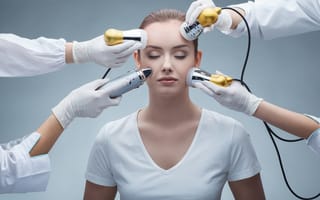Ever wonder how acidic your skin is? Maybe you should. L’Oreal says that healthy skin is slightly acidic, falling somewhere between 4.5 and 5.5 on the pH scale. (To jog your memory of high school biology, the scale is 0 to 14, with 0 at the most acidic end of the spectrum and 14 at the most basic. Water is squarely in the middle at 7.)
Gizmodo reports that L’Oreal has debuted a new prototype sensor at CES 2019 that can measure your skin’s pH levels so you can gauge your skin’s health using a thumb-size, flexible device the outlet described as a chic, small band-aid.
Using “microfluidic technology,” the sensor collects trace amounts of sweat from your pores from your inner arm over a 5-15 minute time period. When you open the accompanying My Skin Track pH app and take a photo of the sensor, the app can determine your skin’s pH levels and analyze your sweat rate to gauge your skin’s health.
Using “microfluidic technology,” the sensor collects trace amounts of sweat from your pores from your inner arm over a 5-15 minute time period. When you open the accompanying My Skin Track pH app and take a photo of the sensor, the app can determine your skin’s pH levels and analyze your sweat rate to gauge your skin’s health. L’Oreal explains that abnormal pH balances are associated with skin conditions such as dryness, eczema, and atopic dermatitis.
L’Oreal’s La Roche-Posay brand partnered with Northwestern University researchers to develop the My Skin Track pH sensor. While Gizmodo notes that recommended skin regimens will likely be strictly from the La Roche-Posay product line, the outlet adds that the availability of a skin pH measurement outside a clinical lab setting is remarkable since large amounts of sweat are a requisite for traditional tests and time is a barrier for most dermatologists.
The sensor did not have a working prototype available for testing at CES, according to Gizmodo. Global Vice President of the L’Oréal Technology Incubator Guive Balooch told the outlet that the device still has months of testing ahead before a rollout to consumers.
Balooch also revealed that La Roche-Posay affiliated dermatologists in the U.S. are the first intended user base for the sensor, which will be introduced this year. The research will be instrumental in figuring out the ideal frequency at which users should measure their skin’s pH.
He also added that pricing is yet to be determined. The sensors are one-use only and disposable, but the company plans on a direct-to-consumer device in late 2019.



